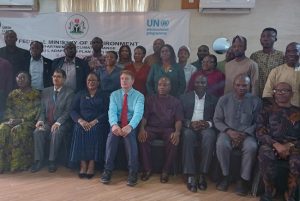Specialists have recommended that the Nigerian government involve rural populations in the National Adaptation Plan (NAP), which is currently being developed, to build resilience and strengthen the country’s preparedness for climate change.

In line with the Cancun Adaptation Framework (CAF), which requires parties to formulate and implement NAPs as a means of identifying medium-to long-term adaptation needs, one important aspect of this process is to conduct a Climate Risk and Vulnerability Assessment (CRVA) to identify communities’ vulnerabilities and propose possible adaptation options to address their issues.
As a result, Nigeria is presently conducting a CRVA in five ecological areas across the country’s six geopolitical zones to establish climate adaptation as a core component of national and economic development in all sectors, allowing citizens to be more proactive rather than reactive to disasters.
The experts said engaging this group in the process will go a long way towards reducing the danger and scale of impacts, as well as ensuring the restoration and rehabilitation of the ecosystem whenever such disruptions occur.
Adaption, according to Lawrence Flint, Nigeria’s team leader for the CRVA project, partly takes place in governance as well as out there in the field, for example, where you have people farming, fishing, and carrying out other livelihood activities.
Speaking at the one-day pre-field mission multi-stakeholders workshop organised by the Federal Ministry of Environment’s Department of Climate Change (DCC), he added that the process should ensure that it brings all segments of society together for a discussion on how to build and implement the plan. This way, the people who must adjust to the changing environment will be able to participate in the process and feel included.
Another issue he raised that is worrisome is climate change and conflict. Many of the ongoing conflicts are being fuelled by climate and ecosystem changes, which are posing a significant challenge for Nigeria.
Flint is confident that if his suggestions are properly integrated into the causes of the nation’s climate risks, it would set the path for the country to begin addressing those issues that are unique not only to Nigeria but to others across the Sahel region.
“And, by that method, we will not always have to face situations where we will need to start calling for humanitarian aid and assistance when everything breaks down after extreme weather obstructs,” he said.
In a similar spirit, Chiranjibi Tiwari, the Climate Change and WASH Manager at the United Nations Children’s Fund (UNICEF), says that inclusion is crucial because it gives room for the voices of young people, the media, civil society organisations, and other relevant stakeholders to be included in the process of creating and implementing the country’s adaptation commitment.
According to him, a landscape climate analysis conducted by UNICEF in 2023 found that Nigerian women and children are more vulnerable to the impacts of climate change in terms of access to health, education, floods, droughts, and other factors.
“So, children are affected, and that is why we believe that children need to be part of this discussion,” he stated.
Tiwari disclosed that his organisation is collaborating with the Federal Ministry of Water Resources to create a strategy that will assist in identifying and mitigating Nigeria’s climate change risk.
Nigeria’s environment minister, Balarabe Lawal, emphasised the significance of the process, saying that adapting to climate change is critical to dealing with its consequences.
“Adapting to climate change means taking action to prepare for and adjust to both the current effects of climate change and the predicted impacts in the future,” the minister, who was represented by Dr. Iniobong Abiola-Awe, DC’s director, asserts at the event.
He went on to highlight some of the country’s climate adaptation efforts, such as the 2011 National Adaptation Strategy and Plan of Action on Climate Change in Nigeria (NASPA-CCN), which identified 13 thematic areas in need of urgent adaptation.
When completed, the national adaptation plan, according to the country’s environment helmsman, will help reduce vulnerability to the effects of climate change by increasing adaptive capacity and resilience. It will also make it easier to integrate climate change adaptation into important new and existing policies, programs, and activities, namely development planning processes and strategies, across all relevant sectors and levels, as needed.
By Etta Michael Bisong, Abuja
